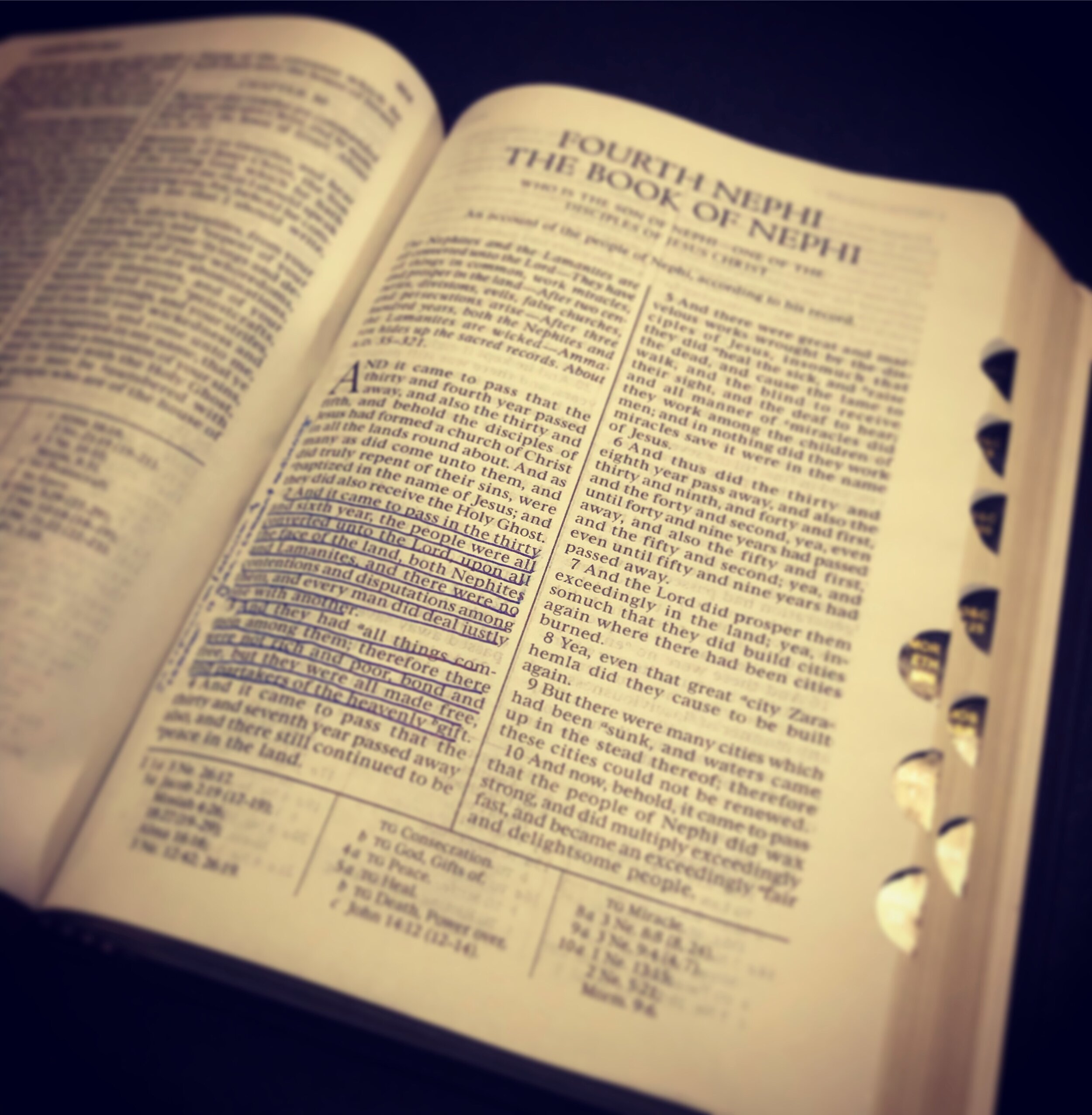Five Ways Toward Latter-day Saint Inclusivity
To listen to this blog, click play below. To read the blog, scroll past the Soundcloud.
In Invocation
Yesterday, I published a long Twitter thread in which I was very critical of Latter-day Saint leaders, specifically a member of the Seventy and an Apostle. I believe that we sustain leadership by being critical of them; it is how we help them stay honest and true to their great responsibilities.
We entrust in our leaders, especially our religious and spiritual leaders, our protection and salvation. With that trust, our leaders gain immense power over large amounts of people. History proves that power usually corrupts a person and that all people are fallible. As such, it is our imperative and our responsibility to sustain through critical assessment because if we do not speak up, then we are not heard and the person in power continues to do things that harm.
However, I don’t like it when someone just speaks up. Speakingup is good and should always be lauded as a valiant and strong action; speakingup and providing solutions to the problems you see is more productive to improvingour lives, our societies, and our religions.
In Provocation
With that preamble, I provide here five ways to be more inclusive of your queer siblings through teaching, ministering, and interacting in a Church-based setting. These aren't all the ways; they're only five. But we have to begin somewhere.
1. Use the term siblings rather than brothers and sisters.
In the Church of Jesus Christ of Latter-day Saints, it is culturally accepted to use “Brothers and Sisters” as a way of addressing a group of Latter-day Saints. In doing this, though, you automatically gender the audience into a binary of male/female. Instead of saying “Brothers and Sisters,” broaden the audience. Instead of “brothers and sisters, we are gathered today to worship Christ through the Sacrament,” say, “Siblings in Christ, we are gathered today to worship our Savior through the Sacrament” or “Children of God, we are gathered today to sing hymns and send prayers to the Most High.” Broaden your use of language in order to include all those in the audience, not just those who believe and live inside a binary.
In addition, to respect those around you who might be trans, ask before calling someone "Brother" or "Sister." A simple "May I call you Brother [Last Name]?" is a great way to respect a person—no matter their gender identity. It allows the person to use their agency to declare what they want to be called, rather than forcing on them a designation according to a M or F on a ward list.
(My personal opinion on this matter is that the whole Brother/Sister thing is weird, and we should call each other by the name we could like to be called rather than an honorific and last name. This would not only be inclusive toward trans* and nonbinary siblings, but encourage better interactions with divorced folx, single folx, and those who do not wish to be defined by their gender, sex, or marital status.)
2. Stress continuing revelation and the openness of heaven.
When teaching a general principle that could be harmful tosome queer folx—like gender, chastity, marriage—teach the principles the manualwants you to, but when teaching the principle, stress the importance ofcontinuing revelation and the openness of heaven to offer more guidance. Thehistory of the doctrine of the Church of Jesus Christ of Latter-day Saints showsthat God is still revealing doctrine—or at the very least, correcting howdoctrine is taught and shared in the Church. This is important for anyonequestioning the Church because it is open about the fallibility of leadership andthe human error that can occur when culture and gospel converge.
3. Listen.
It’s simple. It’s difficult. If, as Alma states, great thingshappen through small and simple things, the smallest and simplest thing you cando is listen. To each and every person that is under your jurisdiction.
It must always be stressed that listening is different than counseling or ministering. Listening requires you to receive what is being given and rarely, if ever, respond. Listening is always discussed in “how to love queer people” because, in general, members of the Church of Jesus Christ of Latter-day Saints don’t know how to do it. Instead of quietly receiving what is being given, a Latter-day Saint, generally, wishes to respond with the “truth” or the “doctrine” or “what God wants for them in their life.”
Listening is a receptive act.
4. Encourage and celebrate the diversity of God's creation.
Every person, no matter their sexuality, gender identity, orplace in the Church, is unique. In celebrating this diversity, a teacher canshow fellow members that the most important thing in their life is their individualplan of salvation, created in concert with the will of God. Focusing on thisdiversity and God’s personal interaction with each of Their children, insteadof emphasizing that God has only one way. Emphasize the flexible and strongrather than stiff and brittle.
5. A gender-inclusive God.
One of the beautiful things about Latter-day Saint theologyis that God is simply a title that beings can wear throughout theireternal life. As such, a teacher can consider God the title to begender-inclusive. Notice I wrote Their in the previous paragraph,instead of His. To me, Their shows the transcendence of God’sgender within the profane, mortal frame of the English language; the pronoun Theirfor God expresses, in humility, the transcendence and exaltation that is thegender of God.
Their is also, in general, an inclusive word in the English language. It can be used to refer to a person, to an unknown person, and to a multitude of people. It is truly versatile. They/them/their can thereby be used to refer to God’s godly person and gender (to a person); to the idea that God cannot be fully known (to an unknown person); or to the doctrine that God as a word is symbolic and represents a multitude of beings, including but not limited to, Heavenly Father, Heavenly Mother, Heavenly Son, and Heavenly Spirit.
While it might sound odd on the tongue, their is a way to be inclusive of gender when considering God, and in having a gender-inclusive God, you allow all people to see themselves with God.
In Benediction
To conclude this blog I turn to a scripture that I’ve beenthinking about while writing this up:
2 And it came to pass in the thirty and sixth year, the people were all converted unto the Lord, upon all the face of the land, both Nephites and Lamanites, and there were no contentions and disputations among them, and every man did deal justly one with another.
3 And they had all things common among them; therefore there were not rich and poor, bond and free, but they were all made free, and partakers of the heavenly gift.
4 Nephi 1:2–3
After Christ visits the Nephites and the Lamanites that survive the cataclysm of the Savior’s death, they grow and develop their lives and society in order to have peace in the land. It takes time—thirty and six years plus—but they work together toward a place of “no contentions and disputations.” Note that this does not say there is no argument within their ranks or polite discussion; there are simply no contentions (note that the third definition in Merriam-Webster is “rivalry, competition”) or disputations (note that this word connotes and denotes an action). In other words, notice that they do not have rivalry or competition and they do not act on that. This means, I assume, that they had fruitful debate and conversation without it ever turning into tribalism or physical reinforcement of belief.
The second verse is interesting in the idea of building up Zion, which is one of the goals of the Church. It says “they had all things common among them.” What could common mean? Were they all similar and there was no diversity among them? No—the verse explains it in the words therefore there were and then explains that class and slavery (things that today could be eschewed as capitalism without social safety nets or ways that encourage equity [class] and racism [slavery]). It’s not that the Zionistic people on the American continent years after Christ’s visit were similar; on the contrary, I assume a group of people who have developed justice and peace in their land are a diverse and respectful people.
So, what I understand from these verses, if the Church of Jesus Christ of Latter-day Saints is to achieve this Zionistic union, it must embrace, encourage, and exalt diversity. Which is a good a way as any to be inclusive of all of God's children.

